formerly eScholarship Editions


|
|
|
|
Your request for similar items found 20 book(s). | Modify Search | Displaying 1 - 20 of 20 book(s) | |
| 1. |  | Title: Insight and solidarity: a study in the discourse ethics of Jürgen Habermas Author: Rehg, William Published: University of California Press, 1997 Subjects: Philosophy | Law | Politics Publisher's Description: Discourse ethics represents an exciting new development in neo-Kantian moral theory. William Rehg offers an insightful introduction to its complex theorization by its major proponent, Jürgen Habermas, and demonstrates how discourse ethics allows one to overcome the principal criticisms that have been leveled against neo-Kantianism.Addressing both "commun-itarian" critics who argue that universalist conceptions of justice sever moral deliberation from community traditions, and feminist advocates of the "ethics of care" who stress the moral significance of caring for other individuals, Rehg shows that discourse ethics combines impartiality with solidarity. He provides the first systematic reconstruction of Habermas's theory and explores its relationship to the work of such contemporary philosophers as Charles Taylor. His book articulates a bold alternative to the split between the "right" and the "good" in moral theory and will greatly interest philosophers, social and legal scholars, and political theorists. [brief] Similar Items |
| 2. | 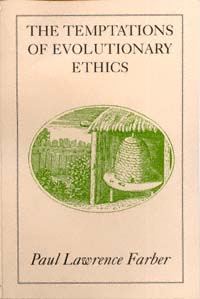 | Title: The temptations of evolutionary ethics Author: Farber, Paul Lawrence 1944- Published: University of California Press, 1994 Subjects: Philosophy | History | Ethics | History and Philosophy of Science Publisher's Description: Evolutionary theory tells us about our biological past; can it also guide us to a moral future? Paul Farber's compelling book describes a century-old philosophical hope held by many biologists, anthropologists, psychologists, and social thinkers: that universal ethical and social imperatives are built into human nature and can be discovered through knowledge of evolutionary theory.Farber describes three upsurges of enthusiasm for evolutionary ethics. The first came in the early years of mid-nineteenth century evolutionary theories; the second in the 1920s and '30s, in the years after the cultural catastrophe of World War I; and the third arrived with the recent grand claims of sociobiology to offer a sound biological basis for a theory of human culture.Unlike many who have written on evolutionary ethics, Farber considers the responses made by philosophers over the years. He maintains that their devastating criticisms have been forgotten - thus the history of evolutionary ethics is essentially one of oft-repeated philosophical mistakes.Historians, scientists, social scientists, and anyone concerned about the elusive basis of selflessness, altruism, and morality will welcome Farber's enlightening book. [brief] Similar Items |
| 3. | 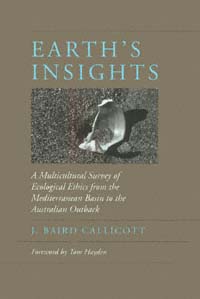 | Title: Earth's insights: a survey of ecological ethics from the Mediterranean basin to the Australian outback Author: Callicott, J. Baird Published: University of California Press, 1997 Subjects: Philosophy | Anthropology | Ethics | Ecology Publisher's Description: The environmental crisis is global in scope, yet contemporary environmental ethics is centered predominantly in Western philosophy and religion. Earth's Insights widens the scope of environmental ethics to include the ecological teachings embedded in non-Western worldviews. J. Baird Callicott ranges broadly, exploring the sacred texts of Islam, Hinduism, Jainism, Taoism, Confucianism, and Zen Buddhism, as well as the oral traditions of Polynesia, North and South America, and Australia. He also documents the attempts of various peoples to put their environmental ethics into practice. Finally, he wrestles with a question of vital importance to all people sharing the fate of this small planet: How can the world's many and diverse environmental philosophies be brought together in a complementary and consistent whole? [brief] Similar Items |
| 4. | 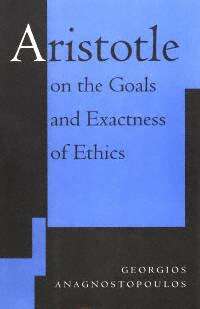 | Title: Aristotle on the goals and exactness of ethics Author: Anagnostopoulos, Georgios Published: University of California Press, 1994 Subjects: Philosophy | Classical Philosophy Publisher's Description: Philosophers as diverse as Socrates, Plato, Spinoza, and Rawls have sometimes argued that ethics can be an exact discipline whose propositions can match the exactness we associate with mathematics. Yet for Aristotle, knowledge of ethical matters is essentially inexact, and his perceptive criticisms of the Socratic-Platonic ideal of ethical knowledge and its metaphysical presuppositions remain of enduring interest to contemporary moral theorists.Georgios Anagnostopoulos offers the most systematic and comprehensive critical examination to date of Aristotle's views on the exactness of ethics. Combining rigorous philosophical argument and close analysis of the philosopher's treatises on human conduct, he gives form to Aristotle's belief that knowledge of matters of conduct, not unlike knowledge of most natural phenomena, can never be free of certain kinds of inexactness. He concludes that according to Aristotle, ethics constitutes a mode of knowledge that is neither totally nondemonstrative on account of its inexactness nor free of the important epistemological difficulties common to all nonmathematical disciplines. [brief] Similar Items |
| 5. | 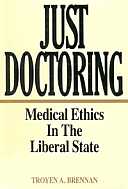 | Title: Just doctoring: medical ethics in the liberal state Author: Brennan, Troyen A Published: University of California Press, 1991 Subjects: Philosophy | Ethics | Medicine Publisher's Description: Just Doctoring draws the doctor-patient relationship out of the consulting room and into the middle of the legal and political arenas where it more and more frequently appears. Traditionally, medical ethics has focused on the isolated relationship of physician to patient in a setting that has left the physician virtually untouched by market constraints or government regulation. Arguing that changes in health care institutions and legal attention to patient rights have made conventional approaches obsolete, Troyen Brennan points the way to a new, more aware and engaged medical ethics.The medical profession is no longer isolated, even theoretically, from the liberal, market-dominated state. Old ideas of physician beneficence and altruism must make way for a justice-based medical ethics, assuming a relationship between equals more compatible with liberal political philosophy. Brennan offers clinical examples of many of today's most challenging medical problems - from informed consent to care rationing and the repercussions of the HIV epidemic - and gives his recommendation for a new ethical perspective. This lively and controversial plea for a rethinking of medical ethics goes right to the heart of medical care at the end of the twentieth century. [brief] Similar Items |
| 6. | 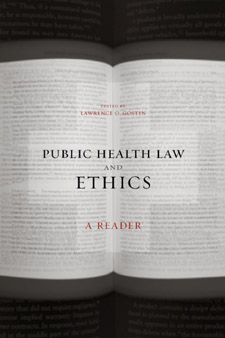 | Title: Public health law and ethics: a reader Author: Gostin, Larry O. (Larry Ogalthorpe) Published: University of California Press, 2002 Subjects: Law | Medicine | Health Care Publisher's Description: This incisive selection of government reports, scholarly articles, and court cases is designed to illuminate the ethical, legal, and political issues in the theory and practice of public health. A companion to the internationally acclaimed Public Health Law: Power, Duty, Restraint, this collection encourages debate and discourse about how courts, scholars, and policy makers respond to the salient legal and ethical dilemmas. The excerpts and commentaries in the reader analyze the legal and constitutional foundations of public health, juxtaposing them with the emerging importance of public health ethics and human rights. The book offers a systematic account of public health law, ethics, and human rights in promoting the common good. Gostin provides thoughtful commentary on the field of public health and carefully explains the meaning and importance of each selection. Scholars, legislators, and public health professionals, as well as faculty and students in schools of law, public health, medicine, nursing, government, and health administration, will benefit from the contemporary case studies covering a wide range of topics from bioterrorism to public health genetics. [brief] Similar Items |
| 7. | 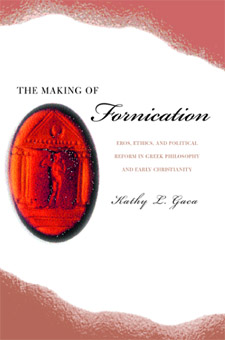 | Title: The making of fornication: eros, ethics, and political reform in Greek philosophy and early Christianity Author: Gaca, Kathy L Published: University of California Press, 2003 Subjects: Classics | Classical Philosophy | Classical Religions | Classical Politics | Christianity | Ethics | Social and Political Thought | Ancient History | Intellectual History Publisher's Description: This provocative work provides a radical reassessment of the emergence and nature of Christian sexual morality, the dominant moral paradigm in Western society since late antiquity. While many scholars, including Michel Foucault, have found the basis of early Christian sexual restrictions in Greek ethics and political philosophy, Kathy L. Gaca demonstrates on compelling new grounds that it is misguided to regard Greek ethics and political theory - with their proposed reforms of eroticism, the family, and civic order - as the foundation of Christian sexual austerity. Rather, in this thoroughly informed and wide-ranging study, Gaca shows that early Christian goals to eradicate fornication were derived from the sexual rules and poetic norms of the Septuagint, or Greek Bible, and that early Christian writers adapted these rules and norms in ways that reveal fascinating insights into the distinctive and largely non-philosophical character of Christian sexual morality. Writing with an authoritative command of both Greek philosophy and early Christian writings, Gaca investigates Plato, the Stoics, the Pythagoreans, Philo of Alexandria, the apostle Paul, and the patristic Christians Clement of Alexandria, Tatian, and Epiphanes, freshly elucidating their ideas on sexual reform with precision, depth, and originality. Early Christian writers, she demonstrates, transformed all that they borrowed from Greek ethics and political philosophy to launch innovative programs against fornication that were inimical to Greek cultural mores, popular and philosophical alike. The Septuagint's mandate to worship the Lord alone among all gods led to a Christian program to revolutionize Gentile sexual practices, only for early Christians to find this virtually impossible to carry out without going to extremes of sexual renunciation. Knowledgeable and wide-ranging, this work of intellectual history and ethics cogently demonstrates why early Christian sexual restrictions took such repressive ascetic forms, and casts sobering light on what Christian sexual morality has meant for religious pluralism in Western culture, especially among women as its bearers. [brief] Similar Items |
| 8. | 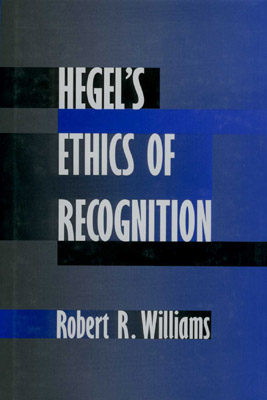 | Title: Hegel's ethics of recognition Author: Williams, Robert R 1939- Published: University of California Press, 1998 Subjects: Philosophy | Ethics Publisher's Description: In this significant contribution to Hegel scholarship, Robert Williams develops the most comprehensive account to date of Hegel's concept of recognition ( Anerkennung ). Fichte introduced the concept of recognition as a presupposition of both Rousseau's social contract and Kant's ethics. Williams shows that Hegel appropriated the concept of recognition as the general pattern of his concept of ethical life, breaking with natural law theory yet incorporating the Aristotelian view that rights and virtues are possible only within a certain kind of community.He explores Hegel's intersubjective concept of spirit ( Geist ) as the product of affirmative mutual recognition and his conception of recognition as the right to have rights. Examining Hegel's Jena manuscripts, his Philosophy of Right , the Phenomenology of Spirit , and other works, Williams shows how the concept of recognition shapes and illumines Hegel's understandings of crime and punishment, morality, the family, the state, sovereignty, international relations, and war. A concluding chapter on the reception and reworking of the concept of recognition by contemporary thinkers including Derrida, Levinas, and Deleuze demonstrates Hegel's continuing centrality to the philosophical concerns of our age. [brief] Similar Items |
| 9. | 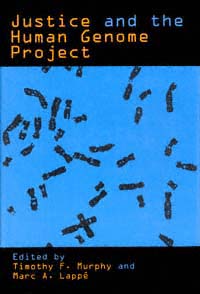 | Title: Justice and the human genome project Author: Murphy, Timothy F 1955- Published: University of California Press, 1994 Subjects: Philosophy | Ethics | Biology | Medicine Publisher's Description: The Human Genome Project is an expensive, ambitious, and controversial attempt to locate and map every one of the approximately 100,000 genes in the human body. If it works, and we are able, for instance, to identify markers for genetic diseases long before they develop, who will have the right to obtain such information? What will be the consequences for health care, health insurance, employability, and research priorities? And, more broadly, how will attitudes toward human differences be affected, morally and socially, by the setting of a genetic "standard"?The compatibility of individual rights and genetic fairness is challenged by the technological possibilities of the future, making it difficult to create an agenda for a "just genetics." Beginning with an account of the utopian dreams and authoritarian tendencies of historical eugenics movements, this book's nine essays probe the potential social uses and abuses of detailed genetic information. Lucid and wide-ranging, these contributions will provoke discussion among bioethicists, legal scholars, and policy makers. [brief] Similar Items |
| 10. | 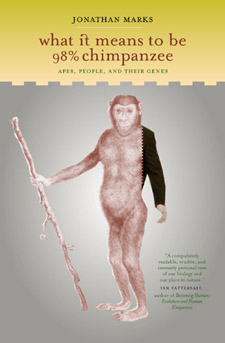 | Title: What it means to be 98% chimpanzee: apes, people, and their genes Author: Marks, Jonathan (Jonathan M.) 1955- Published: University of California Press, 2002 Subjects: EcologyEvolutionEnvironment | Evolution | Physical Anthropology | Sociology | Medicine | Mammalogy Publisher's Description: The overwhelming similarity of human and ape genes is one of the best-known facts of modern genetic sciencenm. But what does this similarity mean? Does it, as many have suggested, have profound implications for understanding human nature? Well-known molecular anthropologist Jonathan Marks uses the human-versus-ape controversy as a jumping-off point for a radical reassessment of a range of provocative issues--from the role of science in society to racism, animal rights, and cloning. Full of interesting facts, fascinating personalities, and vivid examples that capture times and places, this work explains and demystifies human genetic science--showing ultimately how it has always been subject to social and political influences and teaching us how to think critically about its modern findings. Marks presents the field of molecular anthropology--a synthesis of the holistic approach of anthropology with the reductive approach of molecular genetics--as a way of improving our understanding of the science of human evolution. As he explores the intellectual terrain of this field, he lays out its broad areas of interest with issues ranging from the differences between apes and humans to the biological and behavioral variations expressed in humans as a species. Marks confronts head-on the problems of racial classification in science. He describes current theories about race and uses work in primatology, comparative anatomy, and molecular anthropology to debunk them. He also sheds new light on the controversial Great Ape Project, the Human Genome Diversity Project, and much more. This iconoclastic, witty, and extremely readable book illuminates the deep background of human variation and asks us to reconsider the role of science in modern society. [brief] Similar Items |
| 11. | 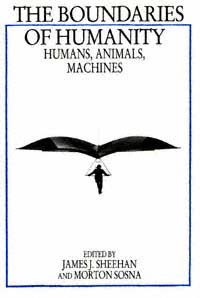 | Title: The Boundaries of humanity: humans, animals, machines Author: Sheehan, James J Published: University of California Press, 1991 Subjects: Philosophy | History and Philosophy of Science | Biology | Technology and Society Publisher's Description: To the age-old debate over what it means to be human, the relatively new fields of sociobiology and artificial intelligence bring new, if not necessarily compatible, insights. What have these two fields in common? Have they affected the way we define humanity? These and other timely questions are addressed with colorful individuality by the authors of The Boundaries of Humanity .Leading researchers in both sociobiology and artificial intelligence combine their reflections with those of philosophers, historians, and social scientists, while the editors explore the historical and contemporary contexts of the debate in their introductions. The implications of their individual arguments, and the often heated controversies generated by biological determinism or by mechanical models of mind, go to the heart of contemporary scientific, philosophical, and humanistic studies. [brief] Similar Items |
| 12. | 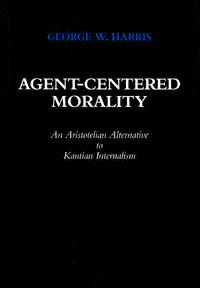 | Title: Agent-centered morality: an Aristotelian alternative to Kantian internalism Author: Harris, George W Published: University of California Press, 1999 Subjects: Philosophy Publisher's Description: What kinds of persons do we aspire to be, and how do our aspirations fit with our ideas of rationality? In Agent-Centered Morality , George Harris argues that most of us aspire to a certain sort of integrity: We wish to be respectful of and sympathetic to others, and to be loving parents, friends, and members of our communities. Against a prevailing Kantian consensus, Harris offers an Aristotelian view of the problems presented by practical reason, problems of integrating all our concerns into a coherent, meaningful life in a way that preserves our integrity. The task of solving these problems is "the integration test."Systematically addressing the work of major Kantian thinkers, Harris shows that even the most advanced contemporary versions of the Kantian view fail to integrate all of the values that correspond to what we call a moral life. By demonstrating how the meaning of life and practical reason are internally related, he constructs from Aristotle's thought a conceptual scheme that successfully integrates all the characteristics that make a life meaningful, without jeopardizing the place of any. Harris's elucidation of this approach is a major contribution to debates on human agency, practical reason, and morality. [brief] Similar Items |
| 13. | 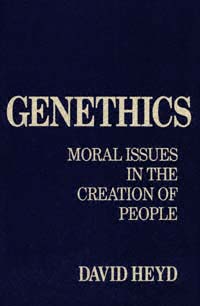 | Title: Genethics: moral issues in the creation of people Author: Heyd, David Published: University of California Press, 1992 Subjects: Philosophy | Ethics Publisher's Description: Unprecedented advances in medicine, genetic engineering, and demographic forecasting raise new questions that strain the categories and assumptions of traditional ethical theories. Heyd's approach resolves many paradoxes in intergenerational justice, while offering a major test case for the profound . . . [more] Similar Items |
| 14. | 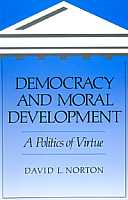 | Title: Democracy and moral development Author: Norton, David L Published: University of California Press, 1990 Subjects: Philosophy | Political Theory | Ethics Publisher's Description: At a time when politics and virtue seem less compatible than oil and water, Democracy and Moral Development shows how to bring the two together. Philosopher David Norton applies classical concepts of virtue to the premises of modern democracy. The centerpiece of the book is a model of organizational . . . [more] Similar Items |
| 15. |  | Title: Secure from rash assault: sustaining the Victorian environment Author: Winter, James H 1925- Published: University of California Press, 1999 Subjects: History | Victorian History | Ecology | Geography | Technology and Society Publisher's Description: Nineteenth-century Britain led the world in technological innovation and urbanization, and unprecedented population growth contributed as well to the "rash assault," to quote Wordsworth, on Victorian countrysides. Yet James Winter finds that the British environment was generally spared widespread ecological damage.Drawing from a remarkable variety of sources and disciplines, Winter focuses on human intervention as it not only destroyed but also preserved the physical environment. Industrial blight could be contained, he says, because of Britain's capacity to import resources from elsewhere, the conservative effect of the estate system, and certain intrinsic limitations of steam engines. The rash assault was further blunted by traditional agricultural practices, preservation of forests, and a growing recreation industry that favored beloved landscapes. Winter's illumination of Victorian attitudes toward the exploitation of natural resources offers a valuable preamble to ongoing discussions of human intervention in the environment. [brief] Similar Items |
| 16. | 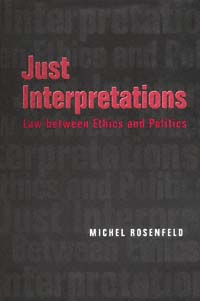 | Title: Just interpretations: law between ethics and politics Author: Rosenfeld, Michel 1948- Published: University of California Press, 1998 Subjects: American Studies | Social and Political Thought | Political Theory Publisher's Description: In pluralistic societies that lack common ethical, social, and political values, legal interpretation is constantly under siege. Just interpretations - that is, interpretations that reflect a shared vision of justice - may become just interpretations in the sense of mere interpretations, rooted in the orientations and interests of different groups. Confronting this crisis in legal interpretation, Just Interpretations offers a critical appraisal of the principal theoretical trends in contemporary American and European jurisprudence and proposes an alternative approach.Michel Rosenfeld's critique focuses on neoformalism, pragmatism, discourse theory, and legal autopoiesis, and includes discussions of such authors as Habermas, Rorty, Posner, Luhmann, Dworkin, Fish, and Weinrib. To overcome the drawbacks of these theories, Rosenfeld elaborates a theory of "comprehensive pluralism," based on a substantive vision of pluralism. This approach, building on the insights of deconstruction, turns the fact of pluralism into a guiding normative imperative. Just Interpretations will attract the attention of constitutional scholars, political scientists, and critical theorists, and will also address an interdisciplinary audience interested in texts, interpretations, and postmodern concerns with justice. [brief] Similar Items |
| 17. | 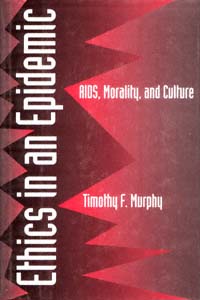 | Title: Ethics in an epidemic: AIDS, morality, and culture Author: Murphy, Timothy F 1955- Published: University of California Press, 1994 Subjects: Philosophy | Sociology | Ethics | Medicine | Social Problems Publisher's Description: AIDS strikes most heavily at those already marginalized by conventional society. With no immediate prospect of vaccination or cure, how can liberty, dignity, and reasoned hope be preserved in the shadow of an epidemic? In this humane and graceful book, philosopher Timothy Murphy offers insight into our attempts - popular and academic, American and non-American, scientific and political - to make moral sense of pain.Murphy addresses the complex moral questions raised by AIDS for health-care workers, politicians, policy makers, and even people with AIDS themselves. He ranges widely, analyzing contrasting visions of the origin and the future of the epidemic, the moral and political functions of obituaries, the uncertain value of celebrity involvement in anti-AIDS education, the functional uses of AIDS in the discourse of presidential campaigns, the exclusionary function of HIV testing for immigrants, the priority given to AIDS on the national health agenda, and the hypnotic publicity given to "innocent" victims.Murphy's discussions of the many social and political confusions about AIDS are unified by his attempt to articulate the moral assumptions framing our interpretations of the epidemic. By understanding those assumptions, we will be in a better position to resist self-serving and invidious moralizing, reckless political response, and social censure of the sick and the dying. [brief] Similar Items |
| 18. | 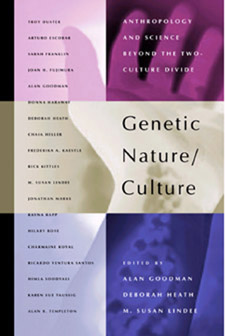 | Title: Genetic nature/culture: anthropology and science beyond the two-culture divide Author: Goodman, Alan H Published: University of California Press, 2003 Subjects: Anthropology | Biology | Sociology Publisher's Description: The so-called science wars pit science against culture, and nowhere is the struggle more contentious - or more fraught with paradox - than in the burgeoning realm of genetics. A constructive response, and a welcome intervention, this volume brings together biological and cultural anthropologists to conduct an interdisciplinary dialogue that provokes and instructs even as it bridges the science/culture divide. Individual essays address issues raised by the science, politics, and history of race, evolution, and identity; genetically modified organisms and genetic diseases; gene work and ethics; and the boundary between humans and animals. The result is an entree to the complicated nexus of questions prompted by the power and importance of genetics and genetic thinking, and the dynamic connections linking culture, biology, nature, and technoscience. The volume offers critical perspectives on science and culture, with contributions that span disciplinary divisions and arguments grounded in both biological perspectives and cultural analysis. An invaluable resource and a provocative introduction to new research and thinking on the uses and study of genetics, Genetic Nature/Culture is a model of fruitful dialogue, presenting the quandaries faced by scholars on both sides of the two-cultures debate. [brief] Similar Items |
| 19. | 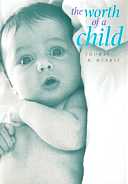 | Title: The worth of a child Author: Murray, Thomas H 1946- Published: University of California Press, 1996 Subjects: Philosophy | Ethics | Medicine | Social Problems | Public Policy Publisher's Description: Thomas Murray's graceful and humane book illuminates one of the most morally complex areas of everyday life: the relationship between parents and children. What do children mean to their parents, and how far do parental obligations go? What, from the beginning of life to its end, is the worth of a child?Ethicist Murray leaves the rarefied air of abstract moral philosophy in order to reflect on the moral perplexities of ordinary life and ordinary people. Observing that abstract moral terms such as altruism and selfishness can be buried in the everyday doings of families, he maintains that ethical theory needs a richer description than it now has of the moral life of parents and children. How far should adults go in their quest for children? What options are available to women who do not want to bear a child now? Should couples be allowed to reject a child because of genetic disability or "wrong" gender? How can we weigh the competing claims of the genetic and the rearing parents to a particular child? The Worth of a Child couples impressive learning with a conversational style. Only by getting down to cases, Murray insists, can we reach moral conclusions that are unsentimental, farsighted, and just. In an era of intense public and private acrimony about the place and meaning of "family values," his practical wisdom about extraordinary difficult moral issues offers compelling reading for both experienced and prospective parents, as well as for ethicists, social and behavioral scientists, and legal theorists. [brief] Similar Items |
| 20. | 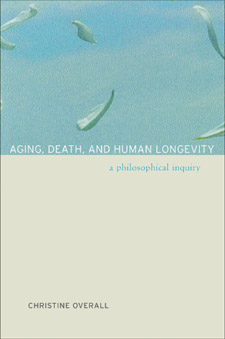 | Title: Aging, death, and human longevity: a philosophical inquiry Author: Overall, Christine 1949- Published: University of California Press, 2003 Subjects: Philosophy | Ethics | Public Policy Publisher's Description: With the help of medicine and technology we are living longer than ever before. As human life spans have increased, the moral and political issues surrounding longevity have become more complex. Should we desire to live as long as possible? What are the social ramifications of longer lives? How does a longer life span change the way we think about the value of our lives and about death and dying? Christine Overall offers a clear and intelligent discussion of the philosophical and cultural issues surrounding this difficult and often emotionally charged issue. Her book is unique in its comprehensive presentation and evaluation of the arguments - both ancient and contemporary - for and against prolonging life. It also proposes a progressive social policy for responding to dramatic increases in life expectancy. Writing from a feminist perspective, Overall highlights the ways that our biases about race, class, and gender have affected our views of elderly people and longevity, and her policy recommendations represent an effort to overcome these biases. She also covers the arguments surrounding the question of the "duty to die" and includes a provocative discussion of immortality. After judiciously weighing the benefits and the risks of prolonging human life, Overall persuasively concludes that the length of life does matter and that its duration can make a difference to the quality and value of our lives. Her book will be an essential guide as we consider our social responsibilities, the meaning of human life, and the prospects of living longer. [brief] Similar Items |